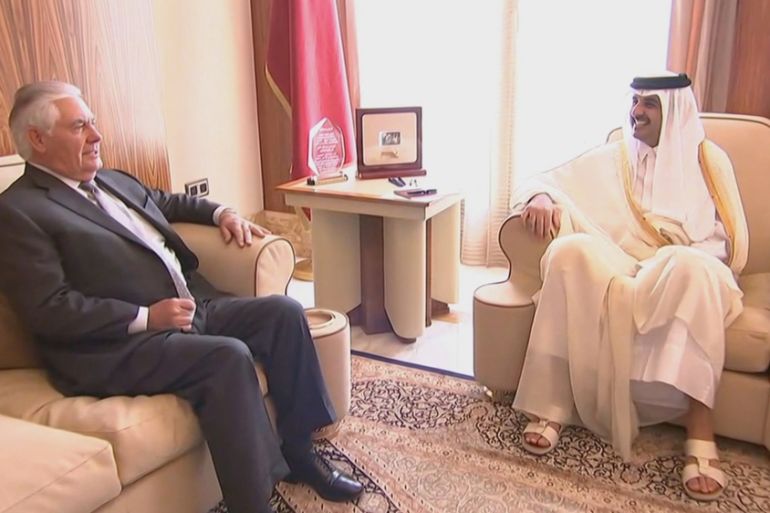US praises Qatar’s role in fight against ‘terrorism’
State Department’s annual country report also says Doha made ‘significant progress’ in combating ‘terrorist’ financing.

The US Department of State praised Qatar’s “strong partnership” in the fight against “terrorism” in its annual “Country Reports on Terrorism” released on Wednesday.
The state department said Doha had “maintained a strong partnership in the fight against terrorism in 2016 and collaborated to foster closer regional and international cooperation on counterterrorism, law enforcement and rule of law activities”.
Qatar, it added, has made “significant progress” in combating “terrorist” financing but “terrorist financiers within the country are still able to exploit Qatar’s informal financial system”.
Al Jazeera’s Mike Hanna, reporting from Washington, DC, said: “However, the report makes very clear too that in 2015 and 2016 Qatar began to successfully prosecute individual financiers who it accused of carrying out these acts.”
READ MORE: Analysis: Qatar-Gulf crisis – Who are the ‘terrorists’?
Saudi Arabia, the United Arab Emirates (UAE), Bahrain and Egypt cut ties with Qatar on June 5 and imposed a land, air and sea blockade on the country.
The quartet accused Qatar of funding “terrorism”, an accusation Qatar rejects as “baseless”.
The state department also said that individuals and “entities” in Saudi Arabia had been channelling money out of the country to “terrorist” organisations and that some of this money may be carried out by pilgrims.
|
|
The United States said Saudi Arabia is making concerted efforts to stop this illegal outflow of cash funds and that: “Saudi Arabia continued to maintain a strong counterterrorism relationship with the United States,” stated the report.
The report also mentioned that individuals have made use of the UAE as a financial hub to funnel money out of the country or through the financial system to “terrorist” groups, but that the UAE had increased its counterterrorism prosecutions.
Emma Ashford, a Research Fellow at the Cato Institute, told Al Jazeera that the state department’s reports tend to talk about Qatar, the UAE and Saudi Arabia in fairly similar language.
“Obviously the state department report doesn’t want to offend countries that are considered US partners or allies. But even within that, all three Gulf states are talked about in the context of their working against terror financing. But they’re also not working perhaps as hard as they could be.”
Qatar and the US signed an agreement earlier this month to help combat “terrorism financing” during a visit to Doha by US Secretary of State Rex Tillerson.
“It’s important to note though that – of all these Gulf countries – Qatar is the only one to have signed a bilateral agreement with the US to combat ‘terror’ financing,” said Al Jazeera’s Mike Hanna.
Overall attacks falling
The report also found that attacks across the globe decreased in 2016 for a second straight year and claimed that Iran is still the world’s leading “state sponsor of terrorism”.
The state department pointed to Tehran’s elite extra-territorial Quds Force that “continued to play a destabilising role” in Iraq, Syria and Yemen.
The report also pointed to a “common thread” in many of the attacks last year, namely “adherence to violent extremist ideology put forth by a fundamentalist strain of Sunni Islam that perceives itself to be under attack by the West and in conflict with other branches of Islam”, particularly attacks directed or inspired by the Islamic State of Iraq and the Levant (ISIL, also known as ISIS) group.
But it said overall attacks had fallen nine percent last year from 2015, and deaths were down 13 percent.
OPINION: What is the Qatar-GCC showdown really about?
More than half of the attacks took place in Iraq, Afghanistan, India, Pakistan and the Philippines, said the department’s acting coordinator for counterterrorism, Justin Siberell.
Attacks and deaths were up notably in Iraq, Somalia and Turkey.
Ashford told Al Jazeera that one of the problems with the State Department’s list of “terror sponsoring nations” is that it is a “very political assessment”.
“This report bears a fairly strong similarity to previous iterations of this report, which have almost uniformly called out Iran and tried to avoid making accusations against other Gulf states,” she said.